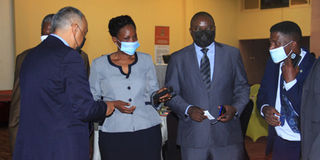Prime
Govt to turn slums in new cities into modern settlements

Lands minister Judith Nabakooba interacts with officials from World Bank and cities in Kampala on Monday. PHOTO /JANE NAFULA
What you need to know:
- Asked why they have allowed slums to develop in the administrative units, Ms Nabakooba said they have been having challenges with land regularisation but they have embarked on a campaign to upgrade them into urban settlements.
The Ministry of Lands, Housing and Urban Development has said the mushrooming slums in newly created cities will be upgraded into modern urban settlements for low-income earners.
While opening the mid-term review workshop for the World Bank funded Uganda Support to Municipal Infrastructure Development Programme (USMID) yesterday, Ms Judith Nabakooba, the Lands minister, said the slums have developed because low income earners have migrated to the cities in search of jobs.
“Recently, 10 municipalities were upgraded into cities and because of their creation, the coverage in kilometres expanded. We have slums where low income earners migrate to the city to work,” she said.
Asked why they have allowed slums to develop in the administrative units, Ms Nabakooba said they have been having challenges with land regularisation but they have embarked on a campaign to upgrade them into urban settlements.
In 2020, Parliament approved the creation of 15 new cities, including Arua, Gulu, Lira, Soroti, Moroto, and Mbale.
Government plans to construct roads, solid waste programmes, pedestrian lanes, beautification in the cities, and extend the programmes in refugee-hosting communities.
Mr Obiga Kania, the State minister for Housing and Urban Development, attributed the slum situation to poor attitude towards physical planning in rural and urban areas.
He said slums affect the implementation of the Parish Development Model because land has been fragmented.
“Where will you build the houses, the city or district headquarters, where will you put the animals, where do you cultivate? Where do you build roads or foot paths? That is why you find the area disorganised,” he said.
In a related workshop last week, Ms Nabakooba said the country’s rapid urbanisation rate of 18 percent needs urgent intervention to avoid slums.
“If deliberate strategies are not put in place to deal with it, our nation will end up in a slum,” she said.
Ms Nabakooba said the National Development Plan III identifies leveraging urbanisation as key driver for social economic transformation.
“We have more to do if we are to gain from potential of wealth creation in urban areas,” she said.
Ms Nabakooba said her ministry is underfunded yet it contributed more than 70 percent of the country’s Gross Domestic Product.
The minister said although USMID has tried to fill the gap of inadequate funding, housing, poor road network, waste management in urban areas, emerging cities are still a challenge.
“While the programme upgraded and tarmacked 200 kilometres of urban roads, this is less than 5 percent of the urban road network in the country,” she said.
Ms Nabakooba also said the support for waste management and waste collection in municipalities is less than 40 percent of the waste generated.
Ms Susan Okalany, the ministry’s Permanent Secretary, said the project, which started in 2013, will end in 2023.




